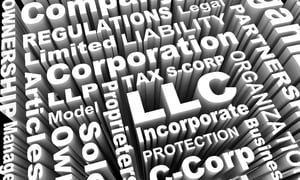 Debt is a common threat that plagues businesses and individuals alike. Sometimes, the last resort is to consider bankruptcy. Do not worry, there are personal and business related bankruptcy options for you! But first, let’s discuss the basics of business entities and debtors.
Debt is a common threat that plagues businesses and individuals alike. Sometimes, the last resort is to consider bankruptcy. Do not worry, there are personal and business related bankruptcy options for you! But first, let’s discuss the basics of business entities and debtors.
Corporations and LLCs are separate entities from the individual who creates them. Much like the creator, the corporation or LLC can own property, take on debt, and operate. It can seem like a foreign concept to anyone, but they were created as separate entities to shield the owners from the liabilities of the business and shield the business from the owners’ liabilities. But wait, what about personally guaranteeing the debts of the business? This is essentially the element that links the two entities. The personal guarantee means the individual becomes personally liable for the debts attached to the business. The individual becomes the guarantor for the debts the corporation or LLC entity has taken on.
A business may file a chapter 7 bankruptcy or a chapter 11 bankruptcy; an individual may file a chapter 7 or chapter 13 bankruptcy.
In a chapter 7 business bankruptcy, the business is officially closed, all assets and liabilities computed, the trustee liquidates the assets, and the proceeds are then paid out to the business’s creditors. The business cannot protect any property and the leftover debt is not discharged. The remaining debt simply exists; a lender may go after the personal guarantor on the remaining debts, but if there are no personal guarantees, the debt simply goes away. The trustee liquidating the business protects the owners from aggressive creditors and additional complex work.
Chapter 11 bankruptcy is a restructuring of the business to give it more time to pay on its debts. These are typically quite complex, have exceptional fees, and are usually performed with large businesses.
It is important to understand that you may file a personal bankruptcy, even if you own a business that has separate debts. If you file a chapter 13 bankruptcy, there is an option to continue operating your business, but it must be generating net income; and, your chapter 13 plan must distribute to your unsecured creditors as if you had filed a chapter 7 bankruptcy. If an individual files a personal chapter 7 bankruptcy, but wants to continue operating the business, the bankruptcy estate will continue having an interest in any increase in value of the business that occurs during the active bankruptcy. It often does not make sense to continue operating the business because the business debt will still remain attached to the open, operating business, opening the assets up to bank liens and potential repossessions.
CALL NOW FOR A FREE STRATEGY SESSION FROM A MN BANKRUPTCY LAWYER AT KAIN & SCOTT
This is a lot of information to learn. Remember, try to think of the best option for you that is easiest, simplest, and less stressful. At Kain & Scott, we can provide the answers and solutions you are searching for, simply set up a consultation at www.kainscott.com or check out our blogs and information postings. We want what is best for you!


